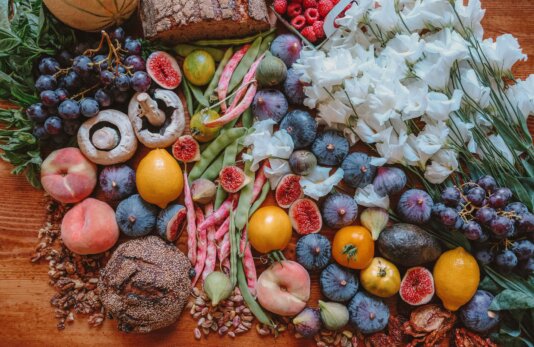- About
- Topics
- Picks
- Audio
- Story
- In-Depth
- Opinion
- News
- Donate
- Signup for our newsletterOur Editors' Best Picks.Send
Read, Debate: Engage.
| topic: | Sustainable Consumption |
|---|---|
| tags: | #food waste, #Hunger, #food security |
| located: | India, United Kingdom, Brazil, Israel, South Africa, Ecuador |
| by: | Doug O’Brien, Emily Broad Leib |
One of the most pressing global challenges is built on a paradox: more than 828 million people are facing hunger in the world today, yet one-third of all food produced for human consumption worldwide continues to be lost or wasted each year.
From inadequate storage infrastructure to oddly shaped vegetables or simply misleading “sell by” dates, too much good food ends up in landfills.
Food banks are one solution that can play a critical role in both supporting people and reducing food waste. But the reality is that food banks today collect and redistribute less than 1 percent of all food that is wasted. There is a huge opportunity to do better.
Recovering even just 25 percent of this lost or wasted food would be enough to meet the needs of hundreds of millions of people who are undernourished, according to the United Nations Environment Programme.
In facing this challenge, governments around the world have traditionally lacked a framework for effective and streamlined policies to ensure that the food produced reaches people and does not go to waste.
As the world faces multiple shocks to the global food system, governments are increasingly recognising that food is too precious a commodity to be wasted when it can instead reduce hunger, nourish communities and even take a bite out of emissions that cause climate change.
In 10 out of the 24 countries researched by The Global Food Donation Policy Atlas, a five-year-long collaboration between our organsations - the Harvard Law School Food Law and Policy Clinic (FLPC) and The Global FoodBanking Network (GFN) - governments have already adopted at least one of the best-in-class policies for food recovery, driving more food donations for hunger relief and reducing food waste.
There is also clear and significant interest among farmers and other food producers in more supportive laws and regulations on food donation. Surveys of food businesses in South Africa highlighted a desire for greater clarity on liability protections when good food is donated.
The surveys also found that businesses showed a greater willingness to donate food when food safety guidance - policies which are lacking throughout most of the world - are adopted by governments.
Our research finds that governments are making progress in several areas of food recovery and donations, which can help inform policy efforts by other governments that seek to feed more people and reduce food waste:
Firstly, governments are increasingly adopting food waste deterrence policies like food donation requirements or penalties, which help curb high levels of food waste.
For example, Ecuador’s 2022 law banning the waste of food that is otherwise fit for human consumption imposes fines on individuals and businesses that run afoul. The law is a crucial pillar in the country’s efforts to address high levels of food insecurity and childhood malnutrition - with nearly one-third of Ecuador’s population suffering from food insecurity in 2020.
Secondly, some governments are adopting liability protections for individuals, businesses, food banks, and charities donating or distributing “apparently wholesome food,” or food that meets quality and labeling standards but might not be readily marketable due to appearance or other conditions, for hunger relief.
Israel, for example, passed a Food Donation Act in 2018, providing civil and criminal liability protection to those donating food and to food distribution organisations, in an effort to cut down the more than two million tons of food wasted annually in the country.
Similarly, Brazil’s 2020 Food Donation Law protects donors and recovery organisations from civil and criminal liability, provided food meets safety requirements and the donor or recovery organisations were not negligent. Such laws are vital in a country where levels of food insecurity nearly doubled between 2018 and 2020, to nearly 20 million people.
Third, countries are working to ensure that donated food meets high standards of food safety, while also clarifying the safety requirements for donated food. This helps donors and recovery organisations understand their obligations under the law and feel more comfortable donating and distributing food that is still safe and edible, but that may be unmarketable for cosmetic or similar reasons.
For instance, India’s 2019 Surplus Food Regulations sets clear safety, handling, and distribution requirements for donating food, as does the United Kingdom’s 2020 Food Safety for Food Banks Guidance policy.
In addition, governments can take additional steps to improve their food donation policies. This includes better tax policy to encourage food donation, creating standardised food date labels, and developing national strategies to protect the natural resources used to produce our food and reduce food waste.
The global food system continues to reel from devastation caused by COVID-19, supply chain disruptions, the war in Ukraine, and the impact of climate change, which makes addressing hunger seem even further out of reach.
Yet, through the proactive work of governments to introduce more effective and often low-cost food donation policies, solutions are possible. Every step - community by community, country by country - can get us that much closer to a world without hunger.
Doug O’Brien is Vice President of Programs at The Global FoodBanking Network. Emily Broad Leib is Director at Harvard Law School Food Law and Policy Clinic.
